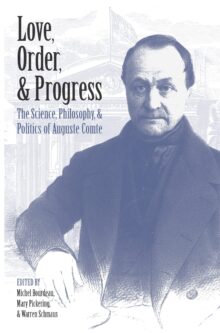

Warren Schmaus
Warren Schmaus is professor of philosophy at Illinois Institute of Technology. He is the author of Rethinking Durkheim and His Tradition and Durkheim’s Philosophy of Science and the Sociology of Knowledge: Creating an Intellectual Niche, and is coeditor of Love, Order, & Progress: The Science, Philosophy, & Politics of Auguste Comte.
Liberty and the Pursuit of Knowledge
Charles Renouvier's Political Philosophy of Science
French philosopher Charles Renouvier played an influential role in reviving philosophy in France after it was proscribed during the Second Empire. Drawn to the ideals of the French Revolution, Renouvier came to recognize that the free will and civil liberties he supported were essential to the pursuit of science, contrary to the ideologies of positivists and socialists who would restrict liberty in the name of science. He struggled against monarchy and religious authority in the period up through 1848 and defended a liberal, secular form of political organization at a critical turning point in French history, the beginning of the Third Republic. As Warren Schmaus argues, Renouvier’s work provides an example of one way in which philosophy of science can succeed in bringing about change in political life—by critiquing political ideologies that falsely claim absolute certainty on religious, scientific, or any other grounds. Liberty and the Pursuit of Knowledge explores the understudied relationship between Renouvier’s philosophy of science and his political philosophy, shedding new light on the significance of his thought for the history of philosophy.
Love, Order, and Progress
The Science, Philosophy, and Politics of Auguste Comte
Auguste Comte’s doctrine of positivism was both a philosophy of science and a political philosophy designed to organize a new, secular, stable society based on positive or scientific, ideas, rather than the theological dogmas and metaphysical speculations associated with the ancien regime. This volume offers the most comprehensive English-language overview of Auguste Comte’s philosophy, the relation of his work to the sciences of his day, and the extensive, continuing impact of his thinking on philosophy and especially secular political movements in Europe, Latin America, and Asia. Contributors consider Comte’s reasons for establishing a Religion of Humanity as well as his views on domestic life and the arts in his positivist utopia. The volume further details Comte’s attempt to apply his “positive method,” first to social science and then to politics and morality, thereby defending the continuity of his career while also critically examining the limits of his approach.


